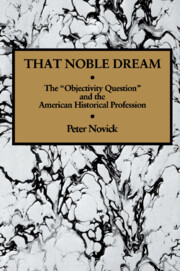Book contents
- Frontmatter
- Contents
- Preface
- Introduction: Nailing jelly to the wall
- I Objectivity enthroned
- 1 The European legacy: Ranke, Bacon, Flaubert
- 2 The professionalization project
- 3 Consensus and legitimation
- 4 A most genteel insurgency
- II Objectivity besieged
- III Objectivity reconstructed
- IV Objectivity in crisis
- Appendix: Manuscript collections cited
- Index
2 - The professionalization project
Published online by Cambridge University Press: 29 March 2011
- Frontmatter
- Contents
- Preface
- Introduction: Nailing jelly to the wall
- I Objectivity enthroned
- 1 The European legacy: Ranke, Bacon, Flaubert
- 2 The professionalization project
- 3 Consensus and legitimation
- 4 A most genteel insurgency
- II Objectivity besieged
- III Objectivity reconstructed
- IV Objectivity in crisis
- Appendix: Manuscript collections cited
- Index
Summary
“Professionalism” has been a central term in recent historical discourse. Robert Wiebe interpreted professionalism as part of the “search for order” in late-nineteenth-century American society. Burton Bledstein saw a “culture of professionalism” as symbolic of the “vertical vision of life” central to the bourgeois world view—and described the new universities as the institutional embodiment of that vision. From a general concern with the phenomenon of professionalism, scholars quickly came to focus on academic disciplines. Developing a point made by John Higham in the early 1960s, Thomas Haskell devoted a volume to recounting how the emergence of professional social science served to resolve a crisis of authority in American intellectual life, while Mary O. Furner saw the tension between advocacy and objectivity producing “a crisis in the professionalization of American social science.”
What, in the case of historians, did “professionalization” mean? What was the relationship between the adoption by historians of the ideal of objectivity, and of the norms of professionalism?
The usual picture of the professionalization of history is one of a speedy and dramatic transformation, rapidly approaching the common list of criteria of a profession: institutional apparatus (an association, a learned journal), standardized training in esoteric skills, leading to certification and controlled access to practice, heightened status, autonomy.
- Type
- Chapter
- Information
- That Noble DreamThe 'Objectivity Question' and the American Historical Profession, pp. 47 - 60Publisher: Cambridge University PressPrint publication year: 1988

